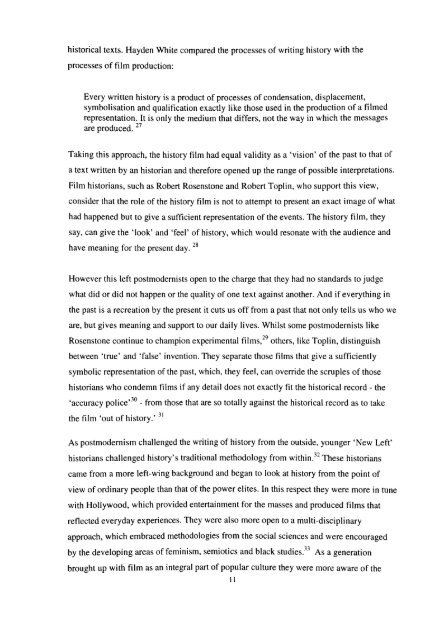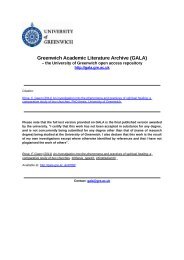Download (3483kB) - Greenwich Academic Literature Archive ...
Download (3483kB) - Greenwich Academic Literature Archive ...
Download (3483kB) - Greenwich Academic Literature Archive ...
- No tags were found...
You also want an ePaper? Increase the reach of your titles
YUMPU automatically turns print PDFs into web optimized ePapers that Google loves.
historical texts. Hayden White compared the processes of writing history with theprocesses of film production:Every written history is a product of processes of condensation, displacement,symbolisation and qualification exactly like those used in the production of a filmedrepresentation. It is only the medium that differs, not the way in which the messagesare produced. 27Taking this approach, the history film had equal validity as a 'vision' of the past to that ofa text written by an historian and therefore opened up the range of possible interpretations.Film historians, such as Robert Rosenstone and Robert Toplin, who support this view,consider that the role of the history film is not to attempt to present an exact image of whathad happened but to give a sufficient representation of the events. The history film, theysay, can give the 'look' and 'feel' of history, which would resonate with the audience andhave meaning for the present day. 28However this left postmodernists open to the charge that they had no standards to judgewhat did or did not happen or the quality of one text against another. And if everything inthe past is a recreation by the present it cuts us off from a past that not only tells us who weare, but gives meaning and support to our daily lives. Whilst some postmodernists likeRosenstone continue to champion experimental films, 29 others, like Toplin, distinguishbetween 'true' and 'false' invention. They separate those films that give a sufficientlysymbolic representation of the past, which, they feel, can override the scruples of thosehistorians who condemn films if any detail does not exactly fit the historical record - the'accuracy police' 30 - from those that are so totally against the historical record as to takethe film 'out of history.' 31As postmodernism challenged the writing of history from the outside, younger 'New Left'historians challenged history's traditional methodology from within. 32 These historianscame from a more left-wing background and began to look at history from the point ofview of ordinary people than that of the power elites. In this respect they were more in tunewith Hollywood, which provided entertainment for the masses and produced films thatreflected everyday experiences. They were also more open to a multi-disciplinaryapproach, which embraced methodologies from the social sciences and were encouragedby the developing areas of feminism, semiotics and black studies. 33 As a generationbrought up with film as an integral part of popular culture they were more aware of the11
















